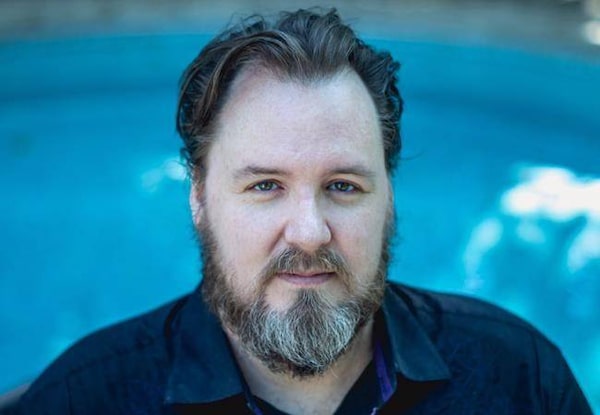
Greg Gilhooly in 2018 published his own account of years of abuse, I Am Nobody: Confronting the Sexually Abusive Coach Who Stole My Life.The Canadian Press
“It was like looking through a mirror at what I went through years ago,” Greg Gilhooly says. “It was soul-destroying watching him there just dripping with such pain.”
Gilhooly was among the millions who have now watched the interview between TSN’s Rick Westhead and onetime top hockey prospect Kyle Beach, in which Beach identified himself as the John Doe of a lawsuit that claims the Chicago Blackhawks management failed to take action after he told them he had been sexually assaulted by one of the coaches.
“I buried this for 10 years, 11 years,” Beach told Westhead, “and it’s destroyed me from the inside out.”
Gilhooly knows the feeling. Once a rising young goaltender in Winnipeg and today an Ontario lawyer, the 57-year-old is still in therapy over what hockey coach Graham James did to him some four decades back. James was eventually convicted of his crimes against several players, including future stars Theo Fleury and Sheldon Kennedy, and served time in jail. Gilhooly originally told his story to The Globe and Mail, and in 2018 published his own account of those years of abuse, I Am Nobody: Confronting the Sexually Abusive Coach Who Stole My Life.
Reactions to Blackhawks scandal pour in from across the sports world
Blackhawks brand could take hit without proper response to sex assault allegation
The John Doe lawsuit led the Blackhawks to commission an outside investigation and the 107-page report on the issue could not have been more damning. In it, Beach says that video coach Brad Aldrich threatened him with a baseball bat, telling him, “If you don’t lay down and act like you enjoy it, I’ll make sure you never play in the NHL or walk again.”
Beach, then a 20-year-old desperate for a professional hockey career, did as he was told. He said the coach then told him, “You can’t tell anyone about this; it is our little secret; no one can find out or I will make sure you never play in the NHL.”
Beach did, however, reveal that “little secret” to mental-skills coach Jim Gary, who took it to a meeting that included, among others, Blackhawks general manager Stan Bowman, then assistant GM Kevin Cheveldayoff and then head coach Joel Quenneville.
Nothing, however, was done. The Blackhawks were in the playoffs and this claim was seen as a distraction. Three weeks later, Chicago had won the Stanley Cup. Aldrich was in the parade, his name would be etched on the trophy – though likely soon to be removed.
“It made me feel like nothing,” Beach said to watch all this unfold. He never played a game in the NHL. Now 31, he is playing out his career in Germany.
Aldrich did leave the team that summer, but not before Quenneville praised him for “a great job” in a job assessment. Aldrich moved on to coach a high-school team in Michigan, where he was later charged and convicted of sexually assaulting a young player.
The fallout from all this? The NHL has fined the Blackhawks US$2-million. Bowman and others in management lost their jobs, as did Quenneville, who had moved on to coach the Florida Panthers. On Friday, Cheveldayoff met with NHL commissioner Gary Bettman and it was decided, as Cheveldayoff was not a member of the senior leadership team in 2010, he “should not be subject to discipline.”
Cheveldayoff released a statement through the Jets expressing “my support of and empathy for Kyle Beach and all he has had to endure since 2010.”
Beach had also approached his union, the NHL Players’ Association, about the incident and, again, nothing was done. The union has since apologized. “There is no doubt that the system failed to support him in his time of need,” said NHLPA head Donald Fehr, “and we are part of that system.”
Gilhooly believes that not only does the system need an overhaul, but the whole culture of hockey needs to change. He says the reason so very few speak out about abuse is because of the intense homophobia that is rampant not just in the NHL but in hockey from the minor leagues to the beer leagues. Homophobic slurs are not only hurled in anger, he says, but in dressing-room banter.
“There are people who use words without knowing or thinking about the underlying meaning,” Gilhooly believes, “and there are people who use those same words with meaning. The difference is as with manslaughter and murder. Either way, you’re going to jail for a long time. We hold out hope that the first group can be rehabilitated, while we walk in fear of ever having to deal with the second.”
Gilhooly believes the culture can change. “It’s about education,” he says. “You only learn to ski and skate by falling down. We have to have a world where you can make a mistake, learn from it, and move on.
“The league is sending the right message – you can’t just sit around and do nothing.” Gilhooly was younger than Beach when he met with his abuser James. He was only 14 when James made contact with him, telling him and his family that he was scouting for talent.
“I would call it ‘trolling,’ not scouting,” Gilhooly says.
He scoffs at those who wonder why the young, fit and much larger Beach didn’t just overpower the small video coach. Gilhooly says these people simply do not understand the power a coach can hold over a young player desperate to succeed.
“I’m 6-foot-7,” he says, “I was big and fit and I could have ended it with one punch. I didn’t. Maybe I should have…
“Maybe that’s why I’m still in therapy…”